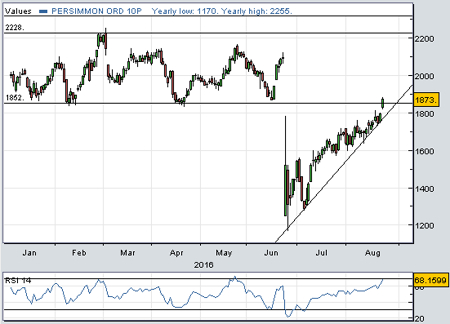What Brexit? Persimmon now up 60% since EU vote
23rd August 2016 13:55
by Harriet Mann from interactive investor
Share on
beat expectations this year following knockout first-half profit and cash generation. The housebuilder and its rivals have raced higher and, after the market recoiled in fear in the aftermath of Brexit, management appears to be suggesting that leaving the European Union will not affect the sector at all.
Of course, Britain's decision to leave the EU has plunged the country and its domestic-focused industries into uncertainty just as employment and disposable incomes improve. But with masses of government stimulus and following decades of chronic underdevelopment, demand for new homes is booming, we hear.
"While the result of the EU referendum has created increased economic uncertainty, customer interest since then has been robust with visitor numbers to our sites around 20% ahead year on year," said chief executive Jeff Fairburn.
"Our private sale reservation rate since 1 July is currently 17% ahead of the same period last year. The group is now trading through the traditionally slower summer weeks but customer demand remains encouraging and we anticipate a good autumn sales season."
Persimmon shares rose as much as 5% Tuesday, breaking above established technical resistance at 1,852p and extending the bullish trendline to within 10% of their closing price on polling day. They had traded as low as 1,170p post-referendum, which means the rally has now stretched to 60% in just two months.
Fairburn's comments are super-bullish, but it's still impossible to say how Brexit will really impact the housebuilders so soon after the EU vote. But for now, Persimmon is set to continue beating expectations.

Sales jumped 12% to £1.49 billion in the six months to 30 June, as management reported last month, with a 330 basis-point surge in operating margin to 23.8% driving pre-tax profit up 29% to £352 million. That gives earnings per share of 92p, up 19%. The number of homes completed and sold in the period rose 6% to 7,239 and forward sales since the end of June are 2% higher than this time last year at £1.75 billion.
Generating almost £230 million of free cash flow in the first half, Persimmon's piggy bank held £462 million at 30 June and its return on average capital employed rose 29% to 35.6%.
A fourth payment as part of its shareholder return programme, worth £338 million, or 110p per share, was paid in April. Persimmon decided to increase the value of its capital return programme earlier this year to £2.76 billion by 2022 - over £1 billion has already been paid out. Cash left over helps buy more land as part of a decade-long strategy launched in 2012.
With a full consented land bank of 93,519 plots, management secured 7,108 new spaces of land in the first half. It's got a strong track record of securing planning consent for its land bank - 2,856 plots were converted in the period.
Warning accompanies upgrade
With such strong margins, broker Shore Capital has upgraded its full-year pre-tax profit forecasts by 2% to £740 million. Analyst Robin Hardy had been ready to cut his 2017 estimate of £825 million, but not now.
Still, his valuation is based on a "bad case scenario" that expects prices to fall 7% in 2018, with sales volumes tumbling 15% and overhead costs climbing 3%. On this basis "fair value" is about 1,800p.
Speculation about a new housing stimulus package in the autumn might also continue to drive the sector higher, although Hardy warns that it could make the new homes market more competitive and risks raising costs. Investors should be wary.
"This stock and the whole sector appear set to be moved more by speculative sentiment than hard events in the market with sentiment most recently looking to drift to the view that Brexit could actually have a very limited impact on the housing market," says Hardy.
"We still believe that there is more risk than is beginning now to be priced in and that the risk from housing policy and stimulus change is not being priced in at all, indeed the opposite with a boost expected.
"Generally, the sector is not expensive but the value we had been in becoming exhausted and we would be more cautious about investment in the sector at or above today's levels."
This article is for information and discussion purposes only and does not form a recommendation to invest or otherwise. The value of an investment may fall. The investments referred to in this article may not be suitable for all investors, and if in doubt, an investor should seek advice from a qualified investment adviser.